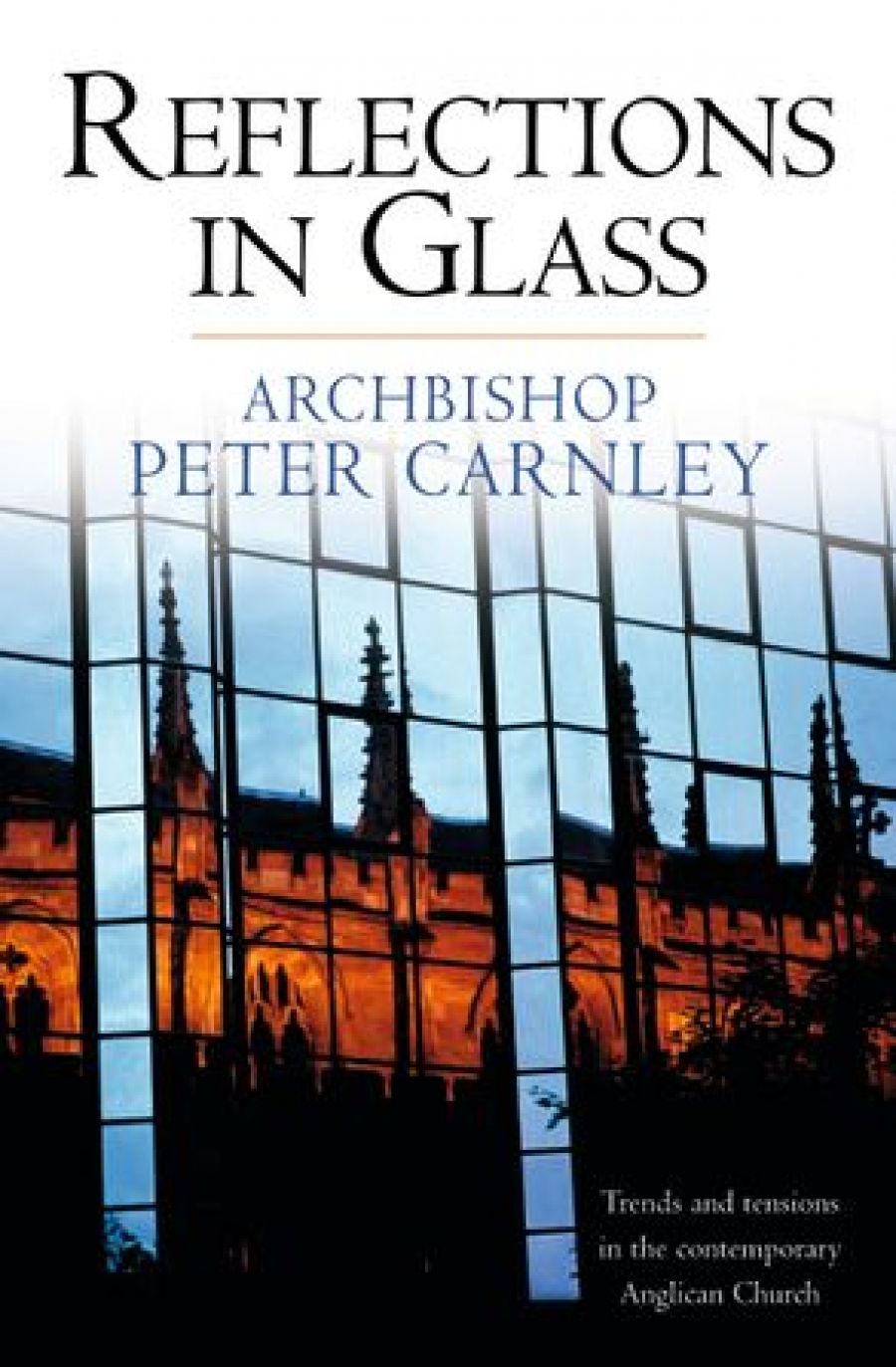
- Free Article: No
- Contents Category: Religion
- Custom Article Title: Anglican Wars
- Review Article: Yes
- Article Title: Anglican Wars
- Online Only: No
- Custom Highlight Text:
The Anglican Church worldwide is currently facing the gravest threat ever to its international unity. Where the vitriolic debates over the ordination of women failed to shatter the Anglican Communion, the ordination of an openly gay bishop in the US in late 2003 may well succeed. Conservative bishops have demanded that the American Episcopal (Anglican) Church’s leaders be disciplined. If the Archbishop of Canterbury does not oblige once an international report has been tabled later this year, the break-up of the Anglican Communion is highly probable.
- Book 1 Title: Reflections in Glass
- Book 1 Subtitle: Trends and tensions in the contemporary Anglican church
- Book 1 Biblio: HarperCollins, $35 pb, 324 pp
- Book 1 Cover Small (400 x 600):

- Book 1 Cover (800 x 1200):

So it is not surprising that many Australian Anglicans were dismayed when, in January, the Primate, Archbishop Peter Carnley of Perth, announced his impending retirement. Dr Carnley will leave his post early next year, just at the time when the international crisis is likely to be at its height. The prospect of facing that crisis without Carnley’s leadership has sent ripples of anxiety through the already anxious Anglican community in this country.
The publication of Reflections in Glass could not have been more timely. Partly anecdotal and autobiographical, partly an historical and theological meditation, Reflections in Glass confronts the issues underlying the current debate, from a theologian of international reputation.
Unlike most Anglican leaders, Carnley is not afraid to engage conservatives in public debate. Until he became Primate in 2000, the usual response from liberal Anglicans was to tread softly. Carnley, however, as an outspoken liberal, had frequently been on the receiving end of conservative invective before he became Primate. His action in ordaining the country’s first women priests ahead of General Synod authorisation in 1992 unleashed a torrent of criticism from leading Sydney Anglicans, for instance. Reflections in Glass is Carnley’s response to a decade and more of criticism from Sydney.
Carnley launches straight into his apologia in the prologue, exploring the sustained criticism to which he was subjected from key Sydney figures at the time of his election as Primate. Newly elected as the national Anglican leader, Carnley had jumped at an invitation from the Bulletin to write for their Easter edition, seizing the chance to ‘communicate religious truth to a wider audience through the columns of an essentially secular publication’. The article, ‘The Rising of the Son’, discussed the resurrection of Jesus from the perspective that he rose from the dead not to confront those who had betrayed and persecuted him but rather to embrace them in forgiveness.
However, an avalanche of criticism, most of it emanating from Sydney, was quickly directed at Carnley for apparently not stressing sufficiently the uniqueness of Jesus (by contrast with the founders of other world religions) as the ‘only way to salvation’. A heated media debate followed, with some 300 separate news items, opinion pieces and letters to the editor in the ensuing weeks around the country. The climate was thus ripe for some Sydney clergy to try to organise a boycott of Carnley’s ceremonial inauguration as Primate, held in Sydney at the end of April 2000, an attempt that caused even more public controversy. In the event, the media furore ensured that St Andrew’s Cathedral was packed with Carnley supporters as a few placard-waving protestors, who presumably imagined they were the ‘champions of Christian ortho-doxy’, waited outside. Reflections in Glass, Carnley explains, is an attempt to explore the underlying issues of his clash with ‘Sydney Anglicanism’ because ‘many people in the pews of our churches and in the Australian community generally’ were left in the dark.
Carnley then explores in some depth the vastly different interpretations of key doctrinal issues and their outworkings that have caused such powerful and public division between people who are, after all, members of the same church. Several chapters deal with central Christian theological truths such as ‘God: Manifestation or Mystery?’, ‘The Nature of Doctrine’, ‘Scripture’ and ‘Cross and Resurrection’. The author offers not only his own position on these important topics but also demonstrates how that position – which he identifies as mainstream Anglicanism – differs from that of his Sydney critics. Those same critics have not hesitated to respond in kind since the publication of this book, accusing Dr Carnley of misunderstanding their views, and describing his theological stance as ‘idiosyncratic’ rather than mainstream.
The rest of the book deals with the way the fundamental differences between conservatives and liberals impact on more pragmatic matters for the Anglican Church, in particular its leadership. An important chapter supports women as bishops, an issue yet to be decided by the Australian Anglican Church. Other chapters look at ongoing debates about lay and priestly ministry, particularly in the context of who should preside at the central Christian rite of Holy Communion.
Reflections in Glass is an important book for anyone seeking to understand the background to the current world Anglican crisis, as well as the more localised disputes that erupt from time to time between Australian Anglicans.


Comments powered by CComment